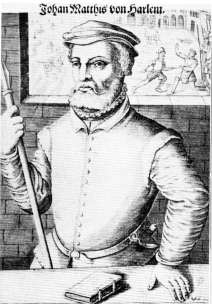Jan Matthys
Jan Matthys (* around 1500 in Haarlem ; † April 5, 1534 in Münster actually Jan Matthijs , also Jan Mathys , Jan von Haarlem , Mathijz , Matthyssen or Mathyszoon ) was a Dutch baker and Baptist .
biography
Live and act
Little is known about Jan Matthys's childhood and youth. He was born in the Netherlands around 1500 and worked as a baker in Haarlem . After joining the Anabaptist movement, he was soon noticed for his radicalism. Melchior Hofmann , a well-known leader of the Anabaptist movement, found an ardent follower in the baker from Haarlem. He disrupted Catholic processions and sermons. In 1528 his tongue was pierced for an alleged blasphemy of the "Corpus Christi". But when Hofmann's prophecies did not materialize in November 1533, Matthys quickly overthrew him. He went on a journey, preached and baptized in Den Briel and Rotterdam . Matthys took the lead named after Melchior Hoffmann Melchiorites in Amsterdam and called as such always the establishment of a theocracy. There Matthys took a lover, whom he hid from her parents, and declared her to be his "spiritual sister". He had previously disowned his former elder wife. This can be seen as an anticipation of the polygyny that was later practiced in Münster . Matthys rejected the pacifism and the theology of nonviolence of Melchior Hofmann more and more and came to the conviction that one had to oppose oppression. The preachers selected by him (whom he called apostles) were particularly successful in Münster .
Anabaptist empire of Munster
In January 1534, Matthys sent Jan van Leiden , whom he himself baptized in November 1533, to Münster as an apostle . On March 2nd, according to other sources in mid-February of the same year, he followed him and declared Munster the new Jerusalem . Although the newly elected city council was positive about the ideas of the Anabaptists, the iconoclasm struck the city on the day Matthys arrived . All of the city's churches and monasteries were devastated to erase the traces of the false past . In Münster he announced his "apocalyptic program":
- The wicked must be destroyed before the return of Christ,
- Christ will establish a world-wide theocracy
- the “apostolic messengers” are invincible and have to warn of the end times.
On February 24, 1534, Matthys asked the people of Münster to be baptized by him. Those who refused had to leave the city by midnight. During this time, Matthys had all books destroyed; except for the Bible . He is considered to be the driving force behind the introduction of a community of property analogous to the community of property of the Jerusalem original community and polygyny (a form of polygamy) in Münster.
The bishop of Münster Franz von Waldeck began to besiege his city in the spring of 1534. In contrast to Hoffmann, who referred to the prophecies of his disciples and the Holy Scriptures, Matthys pretended to act directly on the basis of divine input, visions and visions. Matthys is said to have been a talented rhetorician, and he is said to have used the vacillation between the threat of punishment and reconciliation in order to steer his audience in the desired direction. He also tended to ecstasy, then again to several days of melancholy moods; today he would probably be called manic-depressive . On April 5th, Easter, he gave a sermon on the market square in Munster, in which he claimed to be the new Gideon . He had already equated himself with an Old Testament figure in Amsterdam. He was a new Enoch , the second witness from the Apocalypse. After a vision of an early judgment, Matthys rode out of town unarmed with some of his followers on the same day. Jan Matthys was hacked up by the mercenaries who then threw his remains at each other. When they left, the Anabaptists came out of town with a large wicker basket and picked up the pieces. But his head was speared on a stake and set up in front of the city.
The city of Munster did not fall until June 25, 1535. When the city was stormed, all the Anabaptists who could be caught were killed. This bloodbath was only ended after two days.
The leaders of the Anabaptists, Jan van Leiden , Bernd Krechting and Bernd Knipperdolling , were publicly executed under torture on January 22, 1536.
literature
- Alfred Hrdlicka: Aesthetics of Horror . Rhema-Verl., Münster 2003, ISBN 3-930454-43-2 .
- Helmut Lahrkamp: The Anabaptist Drama . Aschendorff, Münster 2004, ISBN 3-402-05342-X .
- Barbara Rummy: The Kingdom of the Anabaptists in Münster . Lit, Münster 2003, ISBN 3-8258-6253-4 .
- Claus Bernet : Jan Matthys. In: Biographisch-Bibliographisches Kirchenlexikon (BBKL). Volume 21, Bautz, Nordhausen 2003, ISBN 3-88309-110-3 , Sp. 912-916.
- Gerald Döner: Mathys von Harlem, Jan. In: New German Biography (NDB). Volume 16, Duncker & Humblot, Berlin 1990, ISBN 3-428-00197-4 , p. 381 f. ( Digitized version ).
- Carl Adolph Cornelius: Mathyszoon, Jan . In: Allgemeine Deutsche Biographie (ADB). Volume 20, Duncker & Humblot, Leipzig 1884, pp. 600-602.
| personal data | |
|---|---|
| SURNAME | Matthys, Jan |
| ALTERNATIVE NAMES | Jan Matthijs; Jan von Haarlem; Jan Mathys |
| BRIEF DESCRIPTION | Dutch baker and Baptist |
| DATE OF BIRTH | around 1500 |
| PLACE OF BIRTH | Haarlem , the Netherlands |
| DATE OF DEATH | April 5, 1534 |
| Place of death | Munster , Westphalia |
